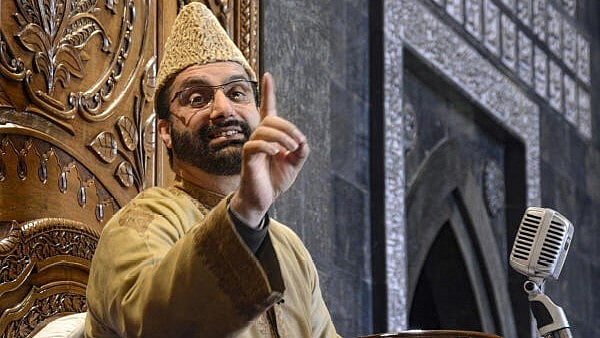
Hurriyat Conference chairman and Kashmir’s chief cleric Mirwaiz Umar Farooq
Credit: PTI Photo
In the heart of Srinagar, where the echoes of separatist slogans once resonated through every alley, Hurriyat Conference chairman and Kashmir’s chief cleric Mirwaiz Umar Farooq now lives quietly.
Once a symbolic centre of Kashmir’s separatist movement and a hub for political dissent, Jamia Masjid in the old city of Srinagar now witnesses a quiet, almost surreal, departure from decades of defiance. Mirwaiz, who once frequently delivered fiery speeches from the mosque, is now often barred from delivering sermons on Fridays.
Syed Ali Geelani, the hardline patriarch, who advocated violent means for achieving ‘azadi’ for almost three decades, passed away in September 2021. His death marked the end of the era of the hardliners. Yasin Malik, once a militant commander who later laid down arms for dialogue and non-violence, now serves a life sentence in Delhi’s Tihar Jail – his political voice silenced behind bars.
Credit: DHNS
In recent weeks, as many as 12 constituents formerly affiliated with the Hurriyat have publicly shunned the path of separatism and expressed their faith in the Constitution of India. A decade ago, such a shift would have been not just improbable, but inconceivable.
The All Parties Hurriyat Conference traces its roots to December 27, 1992, when 19-year-old Mirwaiz Umar Farooq led a meeting that set the stage for its formal launch on July 31, 1993.
Initially, a broad coalition of over two dozen political, religious, and social groups, the Hurriyat quickly became the face of separatist politics in Kashmir, advocating the region’s right to self-determination, a cause that resonated with a significant segment of the Kashmiri population.
Internal divisions soon emerged. Mirwaiz’s moderate faction pushed for dialogue with New Delhi, while Geelani’s hardline camp rejected talks, favouring secession and supporting street protests and militancy.
The 2003 split between the two camps marked the beginning of the Hurriyat’s decline. While Mirwaiz engaged with the successive governments led by Prime Minister Atal Behari Vajpayee and Prime Minister Manmohan Singh, Geelani remained defiant, continuing to support violence and public unrest. According to its constitution, the Hurriyat seeks a peaceful resolution of the Kashmir issue – either through the United Nations resolutions or through tripartite talks among India, Pakistan, and the people of Kashmir.
In recent years, especially after the abrogation of Article 370 by Prime Minister Narendra Modi’s government in August 2019, Mirwaiz has maintained a low profile, further reinforcing his image as a hesitant or cautious separatist. With the separatist movement all but dismantled and the Hurriyat facing obsolescence, his path forward is riddled with complexities.
The recent statement of Union Home Minister Amit Shah that separatism in Kashmir is now history is grounded in the shifting realities on the ground, rather than a mere political claim.
Prof. Noor Ahmed Baba, former head of the political science department at the University of Kashmir, believes the Hurriyat has become redundant, and its chances of a revival are slim in the current political context.
This has left Mirwaiz at a crossroads with the BJP government at the Centre moving to finish the Hurriyat Conference once and for all. Even Mirwaiz acknowledges the ground realities. “Post August 2019, the intense pressure on Hurriyat constituents and members through raids, bans and arrests has considerably weakened the conglomerate,” he told DH.
“There is a disconnect between the people and the Hurriyat. We are not able to control the youth who are at the forefront of this situation,” he acknowledged in September 2024.
The Hurriyat seems to be moving towards a wind-up. A former Hurriyat leader, who wished anonymity, while accepting that the separatist movement in Kashmir was on the verge of closure, said that it was nearly impossible for Mirwaiz to revive it, and he was left with choices.
“Mirwaiz’s cultural and religious capital is immense, but politically, he is on thin ice now. If he pursues the separatist line, the risk of imprisonment is there for which he is not ready. If he relinquishes separatism like most of the second-rung Hurriyat leaders, he will fade into political oblivion,” he said.